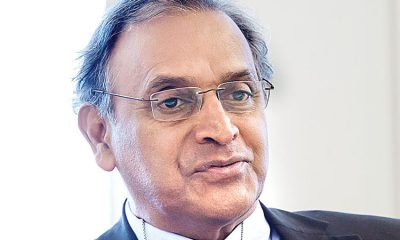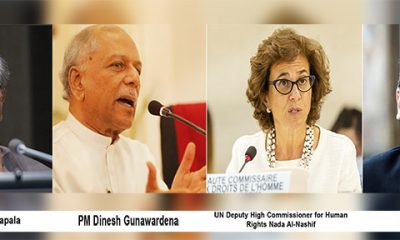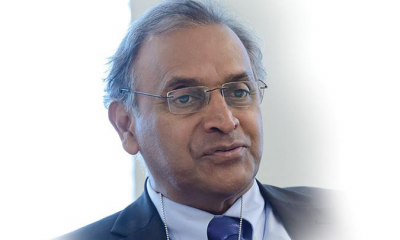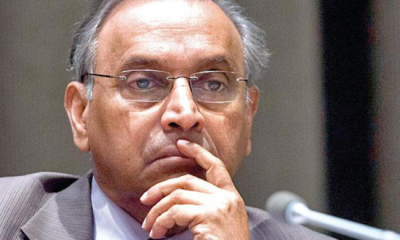Features
JAYANTHA DHANAPALA (1938 – 2023)
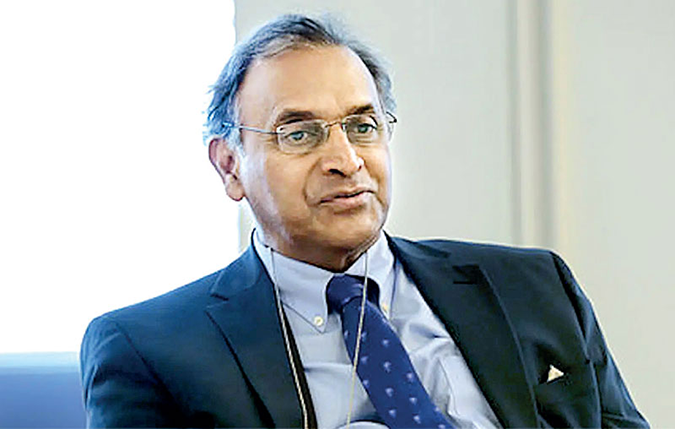
by Tissa Jayatilaka
The splendid career and the many glittering prizes won by Jayantha Dhanapala is common knowledge and does not require reiteration here. Rather I wish to focus on the man himself in this tribute to an exceptional person whom I had the privilege of getting to know personally at the tail end of the 1980s – I had of course heard of Jayantha and his many accomplishments long before our first meeting. Having read a newspaper review of North-South Perspectives, an international affairs journal that I edited, which focused on the promotion of greater understanding between the ‘developed’ and the ‘developing’ world, Jayantha telephoned me to ask if we could meet. I readily agreed and thus began a friendship that lasted until his death a few days ago.
Although I had not known at the time of that first meeting of ours, I soon learnt that encouraging those of the younger generation to contribute their mite to the betterment of Sri Lanka and the world outside of her shores was a priority for Jayantha. In the process, he enabled those of us who came into contact with him to better ourselves in order to continue to give of our best. In his appreciation of Jayantha ‘s life and career, former diplomat A.L.A. Azeez (who joined the Sri Lanka foreign service in 1992) talks at length of the marvellous role of guide and mentor of younger colleagues, including himself, that Jayantha played throughout his days in the foreign service.
In the same spirit, after his retirement from the UN and upon his return to Sri Lanka, he served as a Trustee and member of the Board of Advisers of Sri Lanka Unites, mentoring a local youth movement dedicated to the transformation of Sri Lanka to a land free of religious and ethnic strife. He was involved from the inception in the establishment of the Friday Forum, an informal and self- financed group of older citizens dedicated to democracy, good governance, human rights and the rule of law.
Our friendship grew over the years, I happen to think, because we shared much in common. We both schooled and spent our formative years in Kandy– he at Trinity in the 1950s and I at Kingswood in the 1960s. Later he and I both entered the University of Ceylon, Peradeniya at different times, given that he was a decade older, where we both read for the Special Degree in English. His extra-curricular activities at Peradeniya, like mine, included sports– rugger in his case and cricket in mine– and theatre. We both took part in plays, held office and were participants in the diverse activities of the University Drama Society (DramSoc).
Jayantha and I shared a fondness for the spoken and written word and combined our resources in this area. We jointly edited A Garland for Ashley: Glimpses of a life celebrating the life of Ashley Halpe and His 50 Years of University Teaching (2008). He was instrumental in making me the editor of SIRIMAVO – Honouring the world’s first woman prime minister (2010) for which publication he wrote an excellent essay on The Foreign Policy of Sirimavo Bandaranaike. He contributed a chapter titled, A City Upon a Hill for Excursions and Explorations Cultural Encounters Between Sri Lanka and the United States that I put together in 2002. He reviewed Peradeniya: Memories of a University (1997) that I jointly edited with Silva.
Jayantha served as keynote speaker while I introduced the publication at the launch of the late Tissa Abeysekera’s collection of essays on culture and the arts titled, Roots, Reflections and Reminiscences (2007). A couple of years ago, Jayantha and I teamed up one more time to write an essay titled, A Study in ‘Creative Compassion’ for The Fourth Lion – Essays for Gopalkrishna GANDHI (2021) edited by Venu Madhav Govindu and Srinath Raghavan.
In the 1990s, when our friendship had matured to an extent that I could ask the Dhanapalas for a personal favour, I would on certain of my regular visits to the United States, stay with Maureen and Jayantha whenever they were free of pressing official commitments. I stayed with them in Washington while he was our ambassador (1995-1997) and later in New York when he was serving as Under-Secretary General for Disarmament Affairs (1998-2003). In New York, they would book tickets in advance for plays on Broadway to make my visits even more enjoyable. Their friendship and warm hospitality knew no bounds. I also recall a visit to the UN with my wife Lilani and our daughter Lara when Jayantha hosted us to lunch at a restaurant in the premises of the UN headquarters.
No account of Jayantha would be complete without a reference to the solid and sensitive supporting role played by Maureen in his life and career. She was a superb fellow-traveller who had known Jayantha from a very young age and were fellow undergraduates at Peradeniya as well. If marriages, as we are told, are indeed made in heaven, then theirs undoubtedly would be one of them. They were an extremely compatible and congenial pair to the very end. After their return to Sri Lanka, we had the opportunity to meet Jayantha and Maureen in more relaxed settings over food and drink, either at our home or theirs or in the homes of common friends.
Lilani and I went up to Kandy to spend a long- promised weekend with our senior colleagues and intimate friends Gananath and Ranjini Obeyesekere at April’s end. Knowing of our strong desire to meet Jayantha and Maureen during our visit and, as all of us were close mutual friends, our kind and thoughtful hosts invited the Dhanapalas to lunch at their lovely home. It was when we sat to lunch that it struck me that all six of us around the table, belonging to different eras, had been through the Department of English and read for the Special Degree in English at the University of Ceylon, Peradeniya which later became the University of Peradeniya. Little did we know that one of us would be gone in less than a month and not be around for another meeting over lunch! Impermanence is all.
My one time teacher (he taught Lilani too, in later years), senior colleague in Peradeniya’s Department of English and close friend, Professor Thiru Kandiah, and his wife Indranee, have shared a friendship of much longer standing with the Dhanapalas. Thiru was a year senior to Jayantha at Peradeniya while Indranee and Maureen who had been schoolmates and close friends at Girl’s High School, Kandy, resumed their friendship at a later date at Peradeniya. Their fathers had been members of the Trinity College staff, very close friends and neighbours. Trinity’s Lemuel House was founded when Jayantha was a student at the school with Indranee’s father, the illustrious teacher and Head Master Mr. R.L Kannangara in charge. Jayantha was one of the most outstanding of Lemuel and Indranee’s father soon came to respect and, also like him very much.
The Kandiahs now live in Perth, Australia and realising that they may be unaware of Jayantha’s passing, I wrote to inform them of the sad event. Soon there was a rapid exchange of emails amongst us and I found myself in total agreement with their assessment of the Dhanapalas.
Here is Thiru on Jayantha:
Jayantha was held in especially high esteem and regard by absolutely everybody. This was not least for the obvious brilliance of his mind. But closely allied with that, there was in addition this very distinctive way in which he tended to come across to people in his interactions with them- as of his very nature a signally intellectual sort of person: always impeccably reasoned, and very definitely and firmly so, if in an unostentatious and quietly unassertive, also exemplarily courteous, manner that lent him great dignity; with the unmistakable integrity of the positions he adopted on matters and what he stood for adding considerable power to the strikingly impressive impact he had on people.
Indranee’s pertinent observation is that Maureen is as good natured as she is beautiful and gentle and that the school, “could not have found a better head prefect than her”. She goes on to say that Maureen’s father was a very caring and helpful person and her mother, a gentle and gracious lady. These are sentiments that deserve to be widely shared and hence my doing so.
All in all, Jayantha Dhanapala was a formidable personality, though, never aggressive or unapproachable. He was friendly and unfailingly courteous at all times. I wish to end this tribute with another most appropriate quote from Thiru Kandiah:
Much will, I am sure, be said and written of Jayantha at this time of his leaving us. But the man we were fortunate know and whom we had such affection and respect for will remain in our hearts and minds as long as we are around.
Features
The heart-friendly health minister

by Dr Gotabhya Ranasinghe
Senior Consultant Cardiologist
National Hospital Sri Lanka
When we sought a meeting with Hon Dr. Ramesh Pathirana, Minister of Health, he graciously cleared his busy schedule to accommodate us. Renowned for his attentive listening and deep understanding, Minister Pathirana is dedicated to advancing the health sector. His openness and transparency exemplify the qualities of an exemplary politician and minister.
Dr. Palitha Mahipala, the current Health Secretary, demonstrates both commendable enthusiasm and unwavering support. This combination of attributes makes him a highly compatible colleague for the esteemed Minister of Health.
Our discussion centered on a project that has been in the works for the past 30 years, one that no other minister had managed to advance.
Minister Pathirana, however, recognized the project’s significance and its potential to revolutionize care for heart patients.
The project involves the construction of a state-of-the-art facility at the premises of the National Hospital Colombo. The project’s location within the premises of the National Hospital underscores its importance and relevance to the healthcare infrastructure of the nation.
This facility will include a cardiology building and a tertiary care center, equipped with the latest technology to handle and treat all types of heart-related conditions and surgeries.
Securing funding was a major milestone for this initiative. Minister Pathirana successfully obtained approval for a $40 billion loan from the Asian Development Bank. With the funding in place, the foundation stone is scheduled to be laid in September this year, and construction will begin in January 2025.
This project guarantees a consistent and uninterrupted supply of stents and related medications for heart patients. As a result, patients will have timely access to essential medical supplies during their treatment and recovery. By securing these critical resources, the project aims to enhance patient outcomes, minimize treatment delays, and maintain the highest standards of cardiac care.
Upon its fruition, this monumental building will serve as a beacon of hope and healing, symbolizing the unwavering dedication to improving patient outcomes and fostering a healthier society.We anticipate a future marked by significant progress and positive outcomes in Sri Lanka’s cardiovascular treatment landscape within the foreseeable timeframe.
Features
A LOVING TRIBUTE TO JESUIT FR. ALOYSIUS PIERIS ON HIS 90th BIRTHDAY

by Fr. Emmanuel Fernando, OMI
Jesuit Fr. Aloysius Pieris (affectionately called Fr. Aloy) celebrated his 90th birthday on April 9, 2024 and I, as the editor of our Oblate Journal, THE MISSIONARY OBLATE had gone to press by that time. Immediately I decided to publish an article, appreciating the untiring selfless services he continues to offer for inter-Faith dialogue, the renewal of the Catholic Church, his concern for the poor and the suffering Sri Lankan masses and to me, the present writer.
It was in 1988, when I was appointed Director of the Oblate Scholastics at Ampitiya by the then Oblate Provincial Fr. Anselm Silva, that I came to know Fr. Aloy more closely. Knowing well his expertise in matters spiritual, theological, Indological and pastoral, and with the collaborative spirit of my companion-formators, our Oblate Scholastics were sent to Tulana, the Research and Encounter Centre, Kelaniya, of which he is the Founder-Director, for ‘exposure-programmes’ on matters spiritual, biblical, theological and pastoral. Some of these dimensions according to my view and that of my companion-formators, were not available at the National Seminary, Ampitiya.
Ever since that time, our Oblate formators/ accompaniers at the Oblate Scholasticate, Ampitiya , have continued to send our Oblate Scholastics to Tulana Centre for deepening their insights and convictions regarding matters needed to serve the people in today’s context. Fr. Aloy also had tried very enthusiastically with the Oblate team headed by Frs. Oswald Firth and Clement Waidyasekara to begin a Theologate, directed by the Religious Congregations in Sri Lanka, for the contextual formation/ accompaniment of their members. It should very well be a desired goal of the Leaders / Provincials of the Religious Congregations.
Besides being a formator/accompanier at the Oblate Scholasticate, I was entrusted also with the task of editing and publishing our Oblate journal, ‘The Missionary Oblate’. To maintain the quality of the journal I continue to depend on Fr. Aloy for his thought-provoking and stimulating articles on Biblical Spirituality, Biblical Theology and Ecclesiology. I am very grateful to him for his generous assistance. Of late, his writings on renewal of the Church, initiated by Pope St. John XX111 and continued by Pope Francis through the Synodal path, published in our Oblate journal, enable our readers to focus their attention also on the needed renewal in the Catholic Church in Sri Lanka. Fr. Aloy appreciated very much the Synodal path adopted by the Jesuit Pope Francis for the renewal of the Church, rooted very much on prayerful discernment. In my Religious and presbyteral life, Fr.Aloy continues to be my spiritual animator / guide and ongoing formator / acccompanier.
Fr. Aloysius Pieris, BA Hons (Lond), LPh (SHC, India), STL (PFT, Naples), PhD (SLU/VC), ThD (Tilburg), D.Ltt (KU), has been one of the eminent Asian theologians well recognized internationally and one who has lectured and held visiting chairs in many universities both in the West and in the East. Many members of Religious Congregations from Asian countries have benefited from his lectures and guidance in the East Asian Pastoral Institute (EAPI) in Manila, Philippines. He had been a Theologian consulted by the Federation of Asian Bishops’ Conferences for many years. During his professorship at the Gregorian University in Rome, he was called to be a member of a special group of advisers on other religions consulted by Pope Paul VI.
Fr. Aloy is the author of more than 30 books and well over 500 Research Papers. Some of his books and articles have been translated and published in several countries. Among those books, one can find the following: 1) The Genesis of an Asian Theology of Liberation (An Autobiographical Excursus on the Art of Theologising in Asia, 2) An Asian Theology of Liberation, 3) Providential Timeliness of Vatican 11 (a long-overdue halt to a scandalous millennium, 4) Give Vatican 11 a chance, 5) Leadership in the Church, 6) Relishing our faith in working for justice (Themes for study and discussion), 7) A Message meant mainly, not exclusively for Jesuits (Background information necessary for helping Francis renew the Church), 8) Lent in Lanka (Reflections and Resolutions, 9) Love meets wisdom (A Christian Experience of Buddhism, 10) Fire and Water 11) God’s Reign for God’s poor, 12) Our Unhiddden Agenda (How we Jesuits work, pray and form our men). He is also the Editor of two journals, Vagdevi, Journal of Religious Reflection and Dialogue, New Series.
Fr. Aloy has a BA in Pali and Sanskrit from the University of London and a Ph.D in Buddhist Philosophy from the University of Sri Lankan, Vidyodaya Campus. On Nov. 23, 2019, he was awarded the prestigious honorary Doctorate of Literature (D.Litt) by the Chancellor of the University of Kelaniya, the Most Venerable Welamitiyawe Dharmakirthi Sri Kusala Dhamma Thera.
Fr. Aloy continues to be a promoter of Gospel values and virtues. Justice as a constitutive dimension of love and social concern for the downtrodden masses are very much noted in his life and work. He had very much appreciated the commitment of the late Fr. Joseph (Joe) Fernando, the National Director of the Social and Economic Centre (SEDEC) for the poor.
In Sri Lanka, a few religious Congregations – the Good Shepherd Sisters, the Christian Brothers, the Marist Brothers and the Oblates – have invited him to animate their members especially during their Provincial Congresses, Chapters and International Conferences. The mainline Christian Churches also have sought his advice and followed his seminars. I, for one, regret very much, that the Sri Lankan authorities of the Catholic Church –today’s Hierarchy—- have not sought Fr.
Aloy’s expertise for the renewal of the Catholic Church in Sri Lanka and thus have not benefited from the immense store of wisdom and insight that he can offer to our local Church while the Sri Lankan bishops who governed the Catholic church in the immediate aftermath of the Second Vatican Council (Edmund Fernando OMI, Anthony de Saram, Leo Nanayakkara OSB, Frank Marcus Fernando, Paul Perera,) visited him and consulted him on many matters. Among the Tamil Bishops, Bishop Rayappu Joseph was keeping close contact with him and Bishop J. Deogupillai hosted him and his team visiting him after the horrible Black July massacre of Tamils.
Features
A fairy tale, success or debacle

Sri Lanka-Singapore Free Trade Agreement
By Gomi Senadhira
senadhiragomi@gmail.com
“You might tell fairy tales, but the progress of a country cannot be achieved through such narratives. A country cannot be developed by making false promises. The country moved backward because of the electoral promises made by political parties throughout time. We have witnessed that the ultimate result of this is the country becoming bankrupt. Unfortunately, many segments of the population have not come to realize this yet.” – President Ranil Wickremesinghe, 2024 Budget speech
Any Sri Lankan would agree with the above words of President Wickremesinghe on the false promises our politicians and officials make and the fairy tales they narrate which bankrupted this country. So, to understand this, let’s look at one such fairy tale with lots of false promises; Ranil Wickremesinghe’s greatest achievement in the area of international trade and investment promotion during the Yahapalana period, Sri Lanka-Singapore Free Trade Agreement (SLSFTA).
It is appropriate and timely to do it now as Finance Minister Wickremesinghe has just presented to parliament a bill on the National Policy on Economic Transformation which includes the establishment of an Office for International Trade and the Sri Lanka Institute of Economics and International Trade.
Was SLSFTA a “Cleverly negotiated Free Trade Agreement” as stated by the (former) Minister of Development Strategies and International Trade Malik Samarawickrama during the Parliamentary Debate on the SLSFTA in July 2018, or a colossal blunder covered up with lies, false promises, and fairy tales? After SLSFTA was signed there were a number of fairy tales published on this agreement by the Ministry of Development Strategies and International, Institute of Policy Studies, and others.
However, for this article, I would like to limit my comments to the speech by Minister Samarawickrama during the Parliamentary Debate, and the two most important areas in the agreement which were covered up with lies, fairy tales, and false promises, namely: revenue loss for Sri Lanka and Investment from Singapore. On the other important area, “Waste products dumping” I do not want to comment here as I have written extensively on the issue.
1. The revenue loss
During the Parliamentary Debate in July 2018, Minister Samarawickrama stated “…. let me reiterate that this FTA with Singapore has been very cleverly negotiated by us…. The liberalisation programme under this FTA has been carefully designed to have the least impact on domestic industry and revenue collection. We have included all revenue sensitive items in the negative list of items which will not be subject to removal of tariff. Therefore, 97.8% revenue from Customs duty is protected. Our tariff liberalisation will take place over a period of 12-15 years! In fact, the revenue earned through tariffs on goods imported from Singapore last year was Rs. 35 billion.
The revenue loss for over the next 15 years due to the FTA is only Rs. 733 million– which when annualised, on average, is just Rs. 51 million. That is just 0.14% per year! So anyone who claims the Singapore FTA causes revenue loss to the Government cannot do basic arithmetic! Mr. Speaker, in conclusion, I call on my fellow members of this House – don’t mislead the public with baseless criticism that is not grounded in facts. Don’t look at petty politics and use these issues for your own political survival.”
I was surprised to read the minister’s speech because an article published in January 2018 in “The Straits Times“, based on information released by the Singaporean Negotiators stated, “…. With the FTA, tariff savings for Singapore exports are estimated to hit $10 million annually“.
As the annual tariff savings (that is the revenue loss for Sri Lanka) calculated by the Singaporean Negotiators, Singaporean $ 10 million (Sri Lankan rupees 1,200 million in 2018) was way above the rupees’ 733 million revenue loss for 15 years estimated by the Sri Lankan negotiators, it was clear to any observer that one of the parties to the agreement had not done the basic arithmetic!
Six years later, according to a report published by “The Morning” newspaper, speaking at the Committee on Public Finance (COPF) on 7th May 2024, Mr Samarawickrama’s chief trade negotiator K.J. Weerasinghehad had admitted “…. that forecasted revenue loss for the Government of Sri Lanka through the Singapore FTA is Rs. 450 million in 2023 and Rs. 1.3 billion in 2024.”
If these numbers are correct, as tariff liberalisation under the SLSFTA has just started, we will pass Rs 2 billion very soon. Then, the question is how Sri Lanka’s trade negotiators made such a colossal blunder. Didn’t they do their basic arithmetic? If they didn’t know how to do basic arithmetic they should have at least done their basic readings. For example, the headline of the article published in The Straits Times in January 2018 was “Singapore, Sri Lanka sign FTA, annual savings of $10m expected”.
Anyway, as Sri Lanka’s chief negotiator reiterated at the COPF meeting that “…. since 99% of the tariffs in Singapore have zero rates of duty, Sri Lanka has agreed on 80% tariff liberalisation over a period of 15 years while expecting Singapore investments to address the imbalance in trade,” let’s turn towards investment.
Investment from Singapore
In July 2018, speaking during the Parliamentary Debate on the FTA this is what Minister Malik Samarawickrama stated on investment from Singapore, “Already, thanks to this FTA, in just the past two-and-a-half months since the agreement came into effect we have received a proposal from Singapore for investment amounting to $ 14.8 billion in an oil refinery for export of petroleum products. In addition, we have proposals for a steel manufacturing plant for exports ($ 1 billion investment), flour milling plant ($ 50 million), sugar refinery ($ 200 million). This adds up to more than $ 16.05 billion in the pipeline on these projects alone.
And all of these projects will create thousands of more jobs for our people. In principle approval has already been granted by the BOI and the investors are awaiting the release of land the environmental approvals to commence the project.
I request the Opposition and those with vested interests to change their narrow-minded thinking and join us to develop our country. We must always look at what is best for the whole community, not just the few who may oppose. We owe it to our people to courageously take decisions that will change their lives for the better.”
According to the media report I quoted earlier, speaking at the Committee on Public Finance (COPF) Chief Negotiator Weerasinghe has admitted that Sri Lanka was not happy with overall Singapore investments that have come in the past few years in return for the trade liberalisation under the Singapore-Sri Lanka Free Trade Agreement. He has added that between 2021 and 2023 the total investment from Singapore had been around $162 million!
What happened to those projects worth $16 billion negotiated, thanks to the SLSFTA, in just the two-and-a-half months after the agreement came into effect and approved by the BOI? I do not know about the steel manufacturing plant for exports ($ 1 billion investment), flour milling plant ($ 50 million) and sugar refinery ($ 200 million).
However, story of the multibillion-dollar investment in the Petroleum Refinery unfolded in a manner that would qualify it as the best fairy tale with false promises presented by our politicians and the officials, prior to 2019 elections.
Though many Sri Lankans got to know, through the media which repeatedly highlighted a plethora of issues surrounding the project and the questionable credentials of the Singaporean investor, the construction work on the Mirrijiwela Oil Refinery along with the cement factory began on the24th of March 2019 with a bang and Minister Ranil Wickremesinghe and his ministers along with the foreign and local dignitaries laid the foundation stones.
That was few months before the 2019 Presidential elections. Inaugurating the construction work Prime Minister Ranil Wickremesinghe said the projects will create thousands of job opportunities in the area and surrounding districts.
The oil refinery, which was to be built over 200 acres of land, with the capacity to refine 200,000 barrels of crude oil per day, was to generate US$7 billion of exports and create 1,500 direct and 3,000 indirect jobs. The construction of the refinery was to be completed in 44 months. Four years later, in August 2023 the Cabinet of Ministers approved the proposal presented by President Ranil Wickremesinghe to cancel the agreement with the investors of the refinery as the project has not been implemented! Can they explain to the country how much money was wasted to produce that fairy tale?
It is obvious that the President, ministers, and officials had made huge blunders and had deliberately misled the public and the parliament on the revenue loss and potential investment from SLSFTA with fairy tales and false promises.
As the president himself said, a country cannot be developed by making false promises or with fairy tales and these false promises and fairy tales had bankrupted the country. “Unfortunately, many segments of the population have not come to realize this yet”.
(The writer, a specialist and an activist on trade and development issues . )






